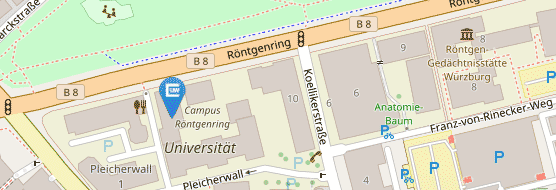Patrick Weis Ph.D.
Ph.D. Patrick Weis
Post Doc
Lehrstuhl für Psychologie III
Röntgenring 11
97070
Würzburg
Deutschland
Gebäude:
Hörsaalgebäude
Raum:
H 10
Telefon:
+49 931 31-86456
E-Mail:
patrick.weis@uni-wuerzburg.de

- Actigraphy
- AdviceSeeking
- Affect
- CognitiveConflict
- CognitiveOffloading
- EDA
- EEG
- Emotion
- ExtendedCognition
- FacePerception
- Feedback
- GazeCueing
- HR
- HumanRobotInteraction
- Language
- Memory
- Metacognition
- MindPerception
- MouseTracking
- PerformanceMonitoring
- Perseveration
- Rotation
- Self
- Sleep
- StrategyChoice
- StrategySelection
- TechnologyUse
- UncannyValley
- fEMG
2024[ to top ]
-
 Weis, P. P., & Kunde, W. (2024). Switching between different cognitive strategies induces switch costs as evidenced by switches between manual and mental object rotation. Scientific Reports, 14(1), 6217. https://doi.org/10.1038/s41598-024-56836-2
Weis, P. P., & Kunde, W. (2024). Switching between different cognitive strategies induces switch costs as evidenced by switches between manual and mental object rotation. Scientific Reports, 14(1), 6217. https://doi.org/10.1038/s41598-024-56836-2
2023[ to top ]
-
 Abubshait, A., Weis, P. P., Momen, A., & Wiese, E. (2023). Perceptual discrimination in the face perception of robots is attenuated compared to humans. Scientific Reports, 13(1), 16708. https://doi.org/10.1038/s41598-023-42510-6
Abubshait, A., Weis, P. P., Momen, A., & Wiese, E. (2023). Perceptual discrimination in the face perception of robots is attenuated compared to humans. Scientific Reports, 13(1), 16708. https://doi.org/10.1038/s41598-023-42510-6 -
 Weis, P. P., & Kunde, W. (2023). Primacy Effects in Extended Cognitive Strategy Choice: Initial Speed Benefits Outweigh Later Speed Benefits. Human Factors: The Journal of the Human Factors and Ergonomics Society. https://doi.org/10.1177/00187208231195747
Weis, P. P., & Kunde, W. (2023). Primacy Effects in Extended Cognitive Strategy Choice: Initial Speed Benefits Outweigh Later Speed Benefits. Human Factors: The Journal of the Human Factors and Ergonomics Society. https://doi.org/10.1177/00187208231195747- [ DOI ]
-
 Daria Dołżycka, J., Nikadon, J., Weis, P. P., Herbert, C., & Formanowicz, M. (2023). Linguistic and emotional responses evoked by pseudoword presentation: An EEG and behavioral study. Brain and Cognition, 168, 105973. https://doi.org/10.1016/j.bandc.2023.105973
Daria Dołżycka, J., Nikadon, J., Weis, P. P., Herbert, C., & Formanowicz, M. (2023). Linguistic and emotional responses evoked by pseudoword presentation: An EEG and behavioral study. Brain and Cognition, 168, 105973. https://doi.org/10.1016/j.bandc.2023.105973- [ DOI ]
-
 Weis, P. P., & Kunde, W. (2023). Overreliance on inefficient computer-mediated information retrieval is countermanded by strategy advice that promotes memory-mediated retrieval. Cognitive Research: Principles and Implications, 8(1), Article 1. https://doi.org/10.1186/s41235-023-00526-6
Weis, P. P., & Kunde, W. (2023). Overreliance on inefficient computer-mediated information retrieval is countermanded by strategy advice that promotes memory-mediated retrieval. Cognitive Research: Principles and Implications, 8(1), Article 1. https://doi.org/10.1186/s41235-023-00526-6- [ DOI ]
2022[ to top ]
-
 Wiese, E., Weis, P. P., Bigman, Y., Kapsaskis, K., & Gray, K. (2022). It’s a Match: Task Assignment in Human--Robot Collaboration Depends on Mind Perception. International Journal of Social Robotics, 14(1), 141-148. https://doi.org/10.1007/s12369-021-00771-z
Wiese, E., Weis, P. P., Bigman, Y., Kapsaskis, K., & Gray, K. (2022). It’s a Match: Task Assignment in Human--Robot Collaboration Depends on Mind Perception. International Journal of Social Robotics, 14(1), 141-148. https://doi.org/10.1007/s12369-021-00771-z -
 Weis, P. P., Nikadon, J., Herbert, C., & Formanowicz, M. (2022). The verb--self link: An implicit association test study. Psychonomic Bulletin & Review, 29(5), 1946-1959. https://doi.org/10.3758/s13423-022-02105-0
Weis, P. P., Nikadon, J., Herbert, C., & Formanowicz, M. (2022). The verb--self link: An implicit association test study. Psychonomic Bulletin & Review, 29(5), 1946-1959. https://doi.org/10.3758/s13423-022-02105-0 -
 Weis, P. P., & Herbert, C. (2022). Do I still like myself? Human-robot collaboration entails emotional consequences. Computers in Human Behavior, 127, 107060. https://doi.org/10.1016/j.chb.2021.107060
Weis, P. P., & Herbert, C. (2022). Do I still like myself? Human-robot collaboration entails emotional consequences. Computers in Human Behavior, 127, 107060. https://doi.org/10.1016/j.chb.2021.107060- [ DOI ]
2021[ to top ]
-
 Abubshait, A., Weis, P. P., & Wiese, E. (2021). Does Context Matter? Effects of Robot Appearance and Reliability on Social Attention Differs Based on Lifelikeness of Gaze Task. International Journal of Social Robotics, 13(5), 863-876. https://doi.org/10.1007/s12369-020-00675-4
Abubshait, A., Weis, P. P., & Wiese, E. (2021). Does Context Matter? Effects of Robot Appearance and Reliability on Social Attention Differs Based on Lifelikeness of Gaze Task. International Journal of Social Robotics, 13(5), 863-876. https://doi.org/10.1007/s12369-020-00675-4
2020[ to top ]
-
 Weis, P. P., & Wiese, E. (2020). Know Your Cognitive Environment! Mental Models as Crucial Determinant of Offloading Preferences. Human Factors: The Journal of the Human Factors and Ergonomics Society, 64(3), 499–513. https://doi.org/10.1177/0018720820956861
Weis, P. P., & Wiese, E. (2020). Know Your Cognitive Environment! Mental Models as Crucial Determinant of Offloading Preferences. Human Factors: The Journal of the Human Factors and Ergonomics Society, 64(3), 499–513. https://doi.org/10.1177/0018720820956861- [ DOI ]
-
 Weis, P. P., & Wiese, E. (2020). Investing in brain-based memory leads to decreased use of technology-based memory. Journal of Experimental Psychology: Applied, 26(3), 465–479. https://doi.org/10.1037/xap0000259
Weis, P. P., & Wiese, E. (2020). Investing in brain-based memory leads to decreased use of technology-based memory. Journal of Experimental Psychology: Applied, 26(3), 465–479. https://doi.org/10.1037/xap0000259- [ DOI ]
-
 Wiese, E., & Weis, P. P. (2020). It matters to me if you are human - Examining categorical perception in human and nonhuman agents. International Journal of Human-Computer Studies, 133, 1–12. https://doi.org/10.1016/j.ijhcs.2019.08.002
Wiese, E., & Weis, P. P. (2020). It matters to me if you are human - Examining categorical perception in human and nonhuman agents. International Journal of Human-Computer Studies, 133, 1–12. https://doi.org/10.1016/j.ijhcs.2019.08.002- [ DOI ]
2019[ to top ]
-
 Weis, P. P., & Wiese, E. (2019). Problem Solvers Adjust Cognitive Offloading Based on Performance Goals. Cognitive Science, 43(12), Article 12. https://doi.org/10.1111/cogs.12802
Weis, P. P., & Wiese, E. (2019). Problem Solvers Adjust Cognitive Offloading Based on Performance Goals. Cognitive Science, 43(12), Article 12. https://doi.org/10.1111/cogs.12802- [ DOI ]
2018[ to top ]
-
 Weis, P. P., & Wiese, E. (2018). Using Tools to Help Us Think: Actual but Also Believed Reliability Modulates Cognitive Offloading. Human Factors: The Journal of the Human Factors and Ergonomics Society, 61(2), 243–254. https://doi.org/10.1177/0018720818797553
Weis, P. P., & Wiese, E. (2018). Using Tools to Help Us Think: Actual but Also Believed Reliability Modulates Cognitive Offloading. Human Factors: The Journal of the Human Factors and Ergonomics Society, 61(2), 243–254. https://doi.org/10.1177/0018720818797553- [ DOI ]
-
 Wiese, E., Weis, P. P., & Lofaro, D. M. (2018). Embodied social robots trigger gaze following in real-time HRI. 2018 15th International Conference on Ubiquitous Robots (UR), 477-482. https://doi.org/10.1109/URAI.2018.8441825
Wiese, E., Weis, P. P., & Lofaro, D. M. (2018). Embodied social robots trigger gaze following in real-time HRI. 2018 15th International Conference on Ubiquitous Robots (UR), 477-482. https://doi.org/10.1109/URAI.2018.8441825
2017[ to top ]
-
 Weis, P. P., & Herbert, C. (2017). Bodily Reactions to Emotional Words Referring to Own versus Other People’s Emotions. Frontiers in Psychology, 8(1277), Article 1277. https://doi.org/10.3389/fpsyg.2017.01277
Weis, P. P., & Herbert, C. (2017). Bodily Reactions to Emotional Words Referring to Own versus Other People’s Emotions. Frontiers in Psychology, 8(1277), Article 1277. https://doi.org/10.3389/fpsyg.2017.01277 -
 Weis, P. P., & Wiese, E. (2017). Cognitive Conflict as Possible Origin of the Uncanny Valley. Proceedings of the Human Factors and Ergonomics Society Annual Meeting, 61(1), 1599–1603. https://doi.org/10.1177/1541931213601763
Weis, P. P., & Wiese, E. (2017). Cognitive Conflict as Possible Origin of the Uncanny Valley. Proceedings of the Human Factors and Ergonomics Society Annual Meeting, 61(1), 1599–1603. https://doi.org/10.1177/1541931213601763- [ DOI ]
2016[ to top ]
-
 Feld, G. B., Weis, P. P., & Born, J. (2016). The Limited Capacity of Sleep-Dependent Memory Consolidation. Frontiers in Psychology, 7(1368), Article 1368. https://doi.org/10.3389/fpsyg.2016.01368
Feld, G. B., Weis, P. P., & Born, J. (2016). The Limited Capacity of Sleep-Dependent Memory Consolidation. Frontiers in Psychology, 7(1368), Article 1368. https://doi.org/10.3389/fpsyg.2016.01368
If you are interested in writing your thesis under my supervision, please contact me directly via email.
Topics center around understanding and improving how humans think with their environments. More recent examples include interactions with robots or conversations with generative AI. Less recent examples include using calculators, internet search, or writing a shopping list. Specifically, topics could include performance monitoring (for example: how do we know whether an AI is fast and accurate?), affective consequences (for example: how do we feel after outsourcing thinking?), or the reasons for seeking environment-based help (for example: why do we ask generative AI instead of our partner or relying on our own memory?).





